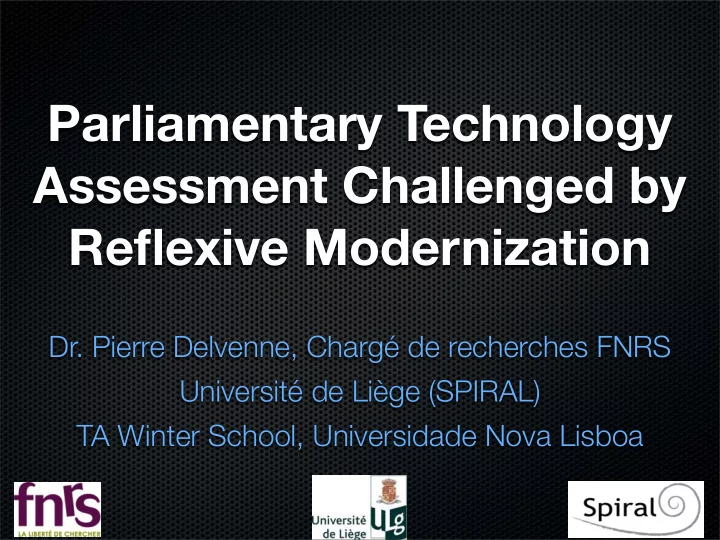

Parliamentary Technology Assessment Challenged by Reflexive Modernization Dr. Pierre Delvenne, Chargé de recherches FNRS Université de Liège (SPIRAL) TA Winter School, Universidade Nova Lisboa
Parliamentary Technology Assessment An imported concept from US to Europe Link with politics Multiple missions of anticipation and evaluation of STI STI effects on society, political agenda and their connexions with decisional processes
5 dimensions, 13 variables 1972 1983 1985 1986
Continued until 2000s (IST) 1987 1989 1990
S&T institutions under pressure Universities need to be excellent while addressing a third mission (orientation to society) Research funding agencies cannot just continue in their original role (Rip, 2000) High-Tech chemical firms and industries have to address their impact on health and the environment PTA have to consider their strategies of how to survive under changing circumstances (DBT, IST)
PTAi facing changes PTAi can be connected to broad sociological diagnoses: risk society (Beck 1992) but also reflexive modernization (Beck et al. 1994) Emergence and evolution of TA reflect the move of Western societies into reflexive modernization process PTAi are indicators of reflexive modernization in action (Delvenne 2010, 2011; Delvenne and Rip, forthcoming)
Reflexive modernization Beck 1986; Giddens 1990; Beck, Giddens and Lash 1994; Beck, Bonss and Lau 2003; Beck and Lau 2005; Beck and Grande 2010 The possibility of discontinuous transformations within modernity A theory of an epochal break characterised by the transformations of the basic institutions of industrial society, while simultaneously preserving the basic principles of modernity (Beck and Grande 2010: 415) Unconscious self-undermining that is also the victory of modernity A circumstance that is a challenge to institutions
A research programme for S&T institutions Avoid reification of reflexive modernization, while identifying important dimensions along which changes in S&T institutions might occur An empirical and a methodological challenge Map what is happening Identify typical responses that add up to specific pathways related to S&T institutions
Conceptual framework Openness to plurality Plurality of values, expertise/participation (e.g. Stirling 2008, Beck and Lau 2005) Blurring of boundaries Boundaries become choices, Construction of new boundaries (e.g. Beck et al. 2003)
The reflexivity pathway Caminante no hay camino Se hace camino al andar. Antonio Machado
Reconstructing institutional pathways: a methodology Reflexive modernization (macro level) Regime (meso level) PTA Institutional practices (micro level)
A «bootstrap operation» Map each individual institutional path along the two dimensions derived from reflexive modernization Create a «master curve» indicative of the shape of the pathway (general pattern) Make inference robust through further data, insights from literature and plausibility arguments
A general, inferred model of reflexivity pathway for PTAi Openness to plurality 2000s Infotain- ment 1980s TA as process 1980s First 1970s generation OTA paradigm Blurring of boundaries
Case studies of individual paths
Openness to plurality STOA Intrumental, technocratic and Late 2000s International political TA activities 2005 2007 Technical Scientific plurality Pairing ETAG consortium (ETAG) Scheme 1987 Creation DM support to elite Blurring of boundaries Scientific reports Strong Interface between bureaucratic restrictions science and politics
TAB Openness to plurality Intrumental, technocratic TA DM support to Bundestag 2000s Timid "going public" Scientific reports 2003 Broadening («democratisation of out outputs expertise», Grünwald "Democrati -sation of 1990 expertise" Creation 2003) ofTAB Blurring of TA and participation as boundaries separate traditions? Bound by its single Interface between modernist client, but it’s part of its success science and politics
DBT Openness to plurality Discursive and social TA Orientation towards consensus + DM support and public depoliticized 1995-now approach Inclusion of participation stakeholders Implication of various 1989 2005 Focus on stakeholders Participation public to ETAG involvement 1985 Scientific reports, Creation deliberative forums Blurring of boundaries (consensus) Struggle for (Private) interface btw survival as a science, politics and P TA society
PTAi on the reflexivity pathway Openness to plurality Rathe nau TA- Swiss IST DBT TAB STOA/ OPEC POST ST OTA Blurring of boundaries
Dynamics of institutionalisation Strong Weak parliamentary parliamentary dynamics dynamics OTA, STOA, TAB DBT, Rathenau, TA-Swiss, IST POST, OPECST * Consequences: path dependence and lock in * Responses: PTAi can resist or accommodate to the resilience of modern institutions
Conclusions Reflexive modernization can be operationalized for empirical research PTAi embrace reflexivity, unless they’re constrained by their context PTAi progression on the reflexivity pathway is: conditioned by the dynamics of institutionalisation limited by modern institutions’ resilience and political culture (e.g. Horst and Irwin 2009)
Thank you for your attention contact: pierre.delvenne@ulg.ac.be
Recommend
More recommend